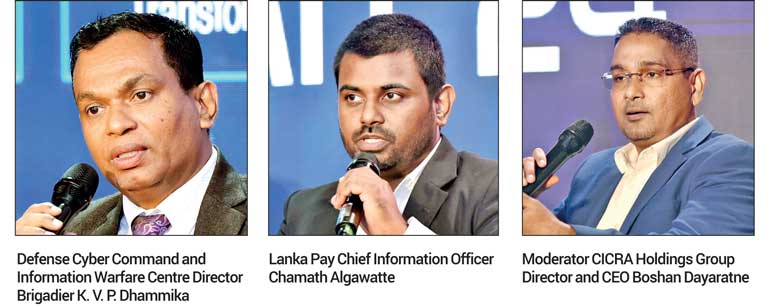Saturday Feb 21, 2026
Saturday Feb 21, 2026
Wednesday, 8 January 2025 00:10 - - {{hitsCtrl.values.hits}}



By Hiyal Biyagamage
In an era where digital connectivity defines both personal and professional spheres, cyber scams have emerged as a rapidly escalating global threat. According to the FBI’s Internet Crime Complaint Centre, reported cyber fraud cases surged by 22% in 2023, with estimated financial losses exceeding $ 10 billion worldwide. Sri Lanka is no exception, witnessing a sharp rise in online scams targeting individuals and businesses alike.
Against this backdrop, the second session of the 10th Daily FT-CICRA Annual Cybersecurity Summit, titled “The Rise of Cyber Scams: How to Detect and Prevent Fraud”, brought together leading experts to tackle this urgent challenge. Through insightful discussions and actionable strategies, the session served as a critical platform to empower organisations and individuals in safeguarding their digital assets. Featuring an esteemed panel of experts, the session shed light on the alarming increase in cyber scams and the psychological tactics behind them.
Defence Cyber Command and Information Warfare Centre Director Brigadier K.V.P. Dhammika highlighted the scale and sophistication of the threat during the panel discussion, “Cyber scams are no longer amateur attempts at fraud; they are carefully orchestrated operations designed to exploit human vulnerabilities and systemic weaknesses. Our response must be equally strategic.”
The panel explored how cybercriminals exploit psychological triggers to manipulate victims. LankaPay Chief Information Security Officer Chamath Agalawatta explained, “Scams thrive on fear, urgency, and trust. Whether it’s a phishing email threatening account suspension or a fake social media post promoting limited time offers, the goal is to make victims act impulsively.” EC Council Master Trainer and Cyber Security Evangelist Belly Rachandianto elaborated on the concept of social engineering, “Social engineering is the art of deception. Scammers don’t just attack systems – they attack people. By manipulating emotions and trust, they bypass even the strongest technical defences.”
Red flags and early detection
The session provided practical guidance for identifying and mitigating cyber scams. During his speech, Brandix Director/COO of Digital Transformation Oshada Senanayake emphasised the importance of vigilance. “Every suspicious email, link, or attachment should be treated as a potential threat. Early detection can mean the difference between a minor inconvenience and a catastrophic breach.”
The experts highlighted key indicators of scams, including misspelled email addresses or URLs, unsolicited requests for sensitive information, and unusual system behaviour, such as unexpected pop-ups or security alerts.
“Think twice before you click,” added CICRA Group Director/CEO Boshan Dayaratne, who moderated the panel discussion. “If something feels off, trust your instincts and verify through official channels.”
Strategies for prevention
The discussion then turned to prevention, with panellists advocating for a multi-layered approach that combines technology, education, and policy. Brigadier Dhammika emphasised the role of advanced cybersecurity technologies. “Investing in tools like intrusion detection systems and endpoint protection is critical. But technology alone is not enough – it must be complemented by informed and vigilant users.”
Chamath Agalawatta highlighted the value of regular employee training, “Your workforce is your first line of defence. Empowering them with knowledge about emerging threats and best practices can significantly reduce vulnerabilities.”
The summit also underscored its commitment to nurturing the next generation of cybersecurity professionals. Since its inception in 2017, the Youth Summit on Cybersecurity has provided students with invaluable insights into global trends and career opportunities in the field.
“Today’s youth are tomorrow’s cybersecurity leaders,” said Belly Rachandianto. “By equipping them with the right skills and knowledge, we are ensuring a safer digital future for all.”
Oshada Senanayake reinforced the importance of inspiring young minds, “Cybersecurity is not just a career – it’s a calling. It’s about protecting the systems and people that drive our world forward.”
Corporate collaboration: A collective defence
The session also highlighted the critical role of collaboration among corporates and cybersecurity experts. Visa, a key partner in this year’s summit, reaffirmed its support for these initiatives. Visa Country Manager for Sri Lanka and Maldives Avanthi Colombage noted, “Cyber threats are a shared challenge. Events like this foster the partnerships and innovations needed to stay ahead of cybercriminals.”
The session concluded with a resounding call to action: Cybersecurity is a shared responsibility. Individuals, organisations, and governments must work together to create a resilient digital ecosystem.
Dayaratne encapsulated the spirit of the summit in his closing remarks, “The digital age offers boundless opportunities, but it also brings unprecedented risks. By staying informed, vigilant, and united, we can protect what matters most.”
Strategic partners of the CEO Forum and the 10th Annual Cyber Security Summit were Visa, Belkasoft, the platinum partners were Huawei and Google Cloud, Gold Partner was Sysco LABS, and Silver Partners were Millennium IT ESP, NCinga, and Just In Time Group. People’s Bank was the Banking Partner, LankaPay was the Official Payment Network Partner whilst Platform Provider was HashX. Electronic media partners were Sirasa TV, TV1 and NewsFirst, while the Podcast Partner was TechTalk360, and Brand Communications Partner was MullenLowe
Sri Lanka.